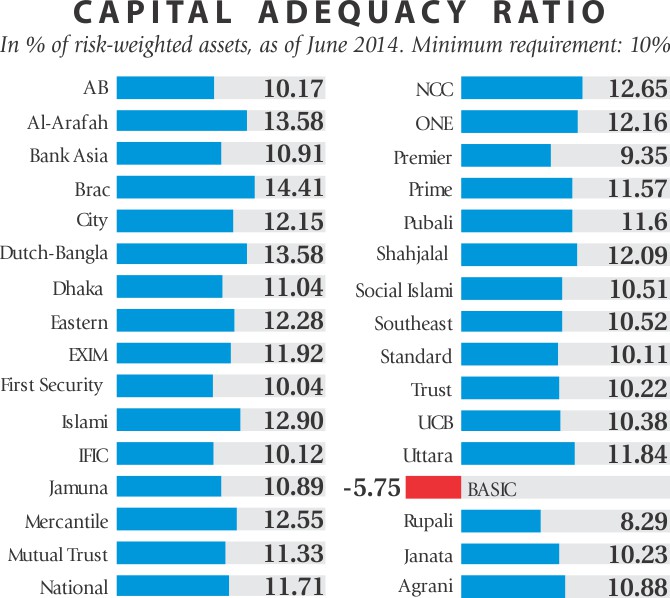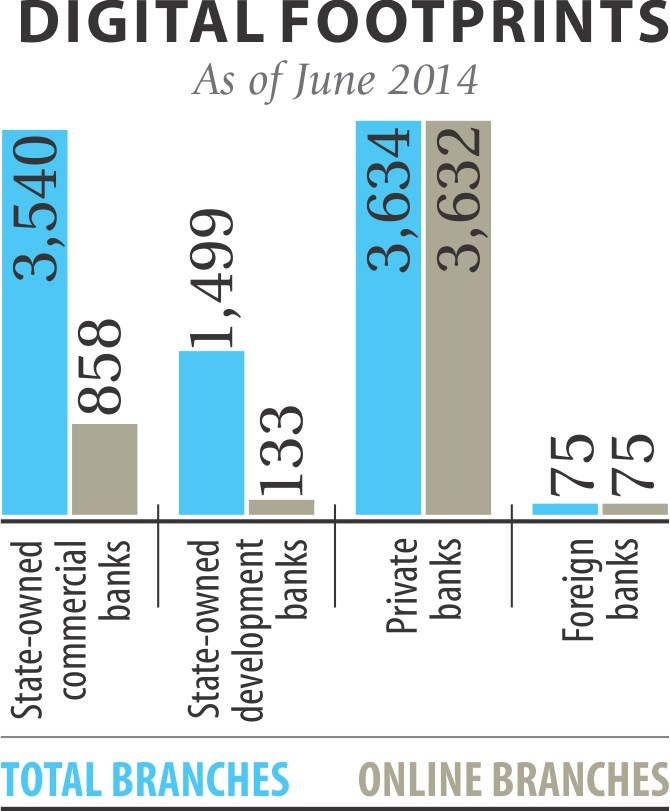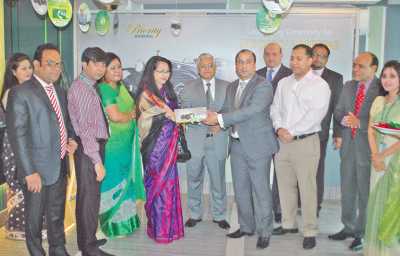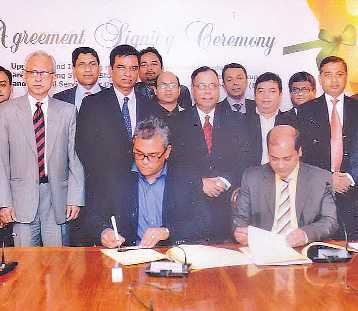Banks' capital falls as defaults pile up

Banks' overall capital base shrank 1.36 percent in the second quarter of this year compared to the first quarter as the asset quality of state banks deteriorated further.
On June 30, the banks' capital was Tk 63,694 crore, which is 10.68 percent of their total risk-weighted assets. The amount was Tk 64,575 crore on March 31, or 11.32 percent of their risk-weighted assets.
In line with international standards, banks have to maintain a capital adequacy ratio (CAR) of 10 percent against their risk-weighted assets.
State-owned commercial banks' capital fell by around 9 percent in June and stood at Tk 9,250 crore mainly due to a rise in default loans.
As capital went down, their CAR now stands at only 8.05 percent, which is embarrassing in the context of a commercial bank. Bank officials said if CAR is low, various charges go up in international business.
State-owned specialised banks, except Bangladesh Development Bank, had no capital at the end of June, rather they had negative capital, which rose by around Tk 600 crore in three months to stand at Tk 4,338 crore.
According to central bank statistics, capital position deteriorated mainly in Sonali, Rupali, BASIC, Bangladesh Krishi and Rajshahi Krishi Unnayan Bank.
At the end of June, Sonali Bank's capital shortfall was Tk 1,511 crore against the requirement of Tk 3,539 crore. The deficit was Tk 278 crore at the end of March.
Zaid Bakht, a director of Sonali Bank, said capital shortfall rose due to a mistake in the accounting system.
Actually, the bank's risk-weighted assets decreased and capital increased in June compared to March, he said.
Bangladesh Krishi Bank's capital shortfall was Tk 5,996 crore at the end of June and that of Rajshahi Krishi Unnayan Bank Tk 650 crore, according to the central bank.
Khondkar Ibrahim Khaled, a former chairman of Bangladesh Krishi Bank, said agriculture-based banks give loans to farmers at low interest rates.
Besides, during any natural calamity these banks cannot realise loans from farmers. As a result, income of the agricultural banks is not as high as that of the commercial banks and hence they always face a capital deficit.
So, the government has to provide them with capital as they work to boost agricultural economy, Khaled said.
He also said the failure of the management of the state banks is the main reason behind the capital shortfall of these banks.
He said the managing directors and deputy managing directors of the state banks should be appointed on the basis of their professionalism, honesty and efficiency.
Capital shortfall of BASIC Bank, another state-owned bank, also increased further to Tk 1,675 crore in June from Tk 1,037 crore three months ago.
An official of the banking division under the finance ministry said the government plans to provide capital to all state banks, including BASIC.
As BASIC Bank has got a new board and management, it may be provided with capital, he said.
He said the banking secretary will meet the finance division secretary soon and take a final decision on which bank will get how much capital. However, the private banks have gone further ahead in raising their capital and the amount rose by 2 percent to Tk 50,148 crore in June.
Only three private banks had a capital shortfall -- Bangladesh Commerce Bank Tk 40 crore, Premier Bank Tk 56 crore and ICB Islamic Bank Tk 1,415 crore.
Except one bank, the foreign banks' capital situation was healthy. On an average, their CAR was 20.64 percent.
News: The Daily Star/2-Sep-2014
State banks slow to go online

The government banks are lagging behind private and foreign banks in introducing online banking for customers, Bangladesh Bank data shows.
BB's quarterly report as of June 2014 shows that all 75 branches of foreign banks and 3,632 branches or 99.94 percent of private banks have introduced online banking, gaining an edge over the state banks.
A mere 858 branches or 24 percent of the total 3,540 branches of state-owned commercial banks offer online coverage. The situation is more depressing with the state-owned development banks; less than nine percent of their branches have an online facility.
“The government's procurement system is stringent and it takes a lot of time to execute a contract,” said SM Aminur Rahman, former managing director of state-owned Janata Bank. He served the bank for six years before his contract expired on July 27.
He pointed at an excessive number of branches and poor locations for the state banks' lagging in adopting automation and online facilities. Many of the branches are located in places with no internet coverage, he added.
Online banking is an electronic payment system that enables a customer of a financial institution to conduct transactions on a website operated by the institution, such as a bank or a non-bank financial institution. Online banking is also known as internet banking, e-banking, or virtual banking.
Bangladesh is relatively late in introducing online banking. The trend gained momentum in the last five to six years. Now, 46 out of 47 banks scheduled before 2013 have adopted the concept to deliver prompt services to its customers.
Under online banking, banks offer services like checking account balances and recent transactions, downloading bank statements and periodic account statements, ordering cheque books, fund transfers between customers' linked accounts, and paying third parties, including bill payment.
Pubali Bank has the largest online banking network in the country with all its 427 branches now offering such services.
“There is no alternative to modern and technology-driven services that have made our tasks easier,” said Helal Ahmed Chowdhury, managing director of the bank.
Pubali has brought all its branches under the online system by using software developed by the bank's own human resources. Chowdhury said Pubali yesterday signed an agreement with Oracle and Aamra Technology to install the latest technology of Oracle Exadata that offers improved online banking services.
“It is tough in today's world to survive without online banking services,” said Touhidul Alam Khan, deputy managing director of newly established Modhumoti Bank that introduced the system from its inception last year.
Khan, who is also the first Certified Sustainability Reporting Assurer in Bangladesh and a pioneer in initiating green banking activities in Bangladesh, said online banking not only serves promptly but also promotes green banking. Masodul Bari, head of IT of Al-Arafah Islami Bank, said online banking helps both bankers and customers.
“A banker can take prompt decisions by analysing data, while a customer can get many services without going to the bank branches.”
Online services are also cost-effective, he said. If a manual transaction costs a bank Tk 10, it is only Tk 0.10 for an online transaction, he added.
News:The Daily Star/2-Sep-2014
SBAC Bank signs MoU with JBL
.jpg)
South Bangla Agriculture and Commerce Bank Ltd (SBAC) signed a Memorandum of understanding (MoU) with Jamuna Bank Limited (JBL) for disbursement of Foreign Remittance as an associate bank of JBL.
Shafiqul Alam, MD and CEO of JBL and Md. Rafiqul Islam, MD and CEO of SBAC Bank signed the MoU on behalf of respective sides, said a press release. Besides, A.K.M. Saifuddin Ahamed, DMD of JBL, Md. Dilwar Hossain Bhuiyan, DMD of SBAC Bank, Md. Abdus Sobhan, Head of NRB Banking and FRD of JBL and Harun Ar Rashid, Head of ID of SBAC Bank Ltd were also present.
Modhumoti Bank launches Priority Banking

Modhumoti Bank Limited launched a new product styled ‘Modhumoti Priority Banking’ for its high-valued customers at a ceremony held at Gulshan branch in Dhaka.
Humayun Kabir, Chairman of the bank inaugurated the launching ceremony as chief guest recently, said a press release. Md Mizanur Rahman, Director, Bengal Group and Managing Director and CEO of the bank were present on the occasion as special guest while high officials of the bank and other clients attended the function.
Pubali Bank signs Tk 46.43cr deal with Oracle, Aamra

Pubali Bank Limited signed an agreement with Oracle and Aamra Technology Limited involving Tk. 46.43 crore at Pubali Bank head office in Dhaka recently.
Mohammad Ali, Chief Technical Officer and General Manager of Information Technology Division of the bank and Syed Farhad Ahmed, Managing Director of Aamra Technology Limited (Platinum Partner of Oracle Corporation) signed the agreement on behalf of their respective organisations.
Mentionable, it is one of the largest investment agreements for infrastructural development in the country’s banking sector. Under this agreement, customers of Pubali Bank will get reliable, secured and fastest service.
Managing Director and CEO of Pubali Bank Limited Helal Ahmed Chowdhury was present as chief guest at the agreement signing ceremony.
Aditional Managing Director M.A. Halim Chowdhury and Deputy Managing Director Safiul Alam Khan Chowdhury of Pubali Bank Ltd were present as special guests. Amit Srivastava, Country Lead, Technology Business, Oracle was also present.
In his speech, Helal Ahmed Chowdhury said, “Pubali Bank Limited has installed the largest Online Banking network through 427 branches across the country by using software developed by its dedicated IT professionals.”
He also said, “Pubali Bank is committed to give modern and technology-based service to cope up with modern banking system. So, we have signed the agreement with Oracle and Aamra Technology Limited to install the latest technology of Oracle Exadata.”
General managers and senior executives of Pubali Bank and other senior officials of both the organisations were also present.



